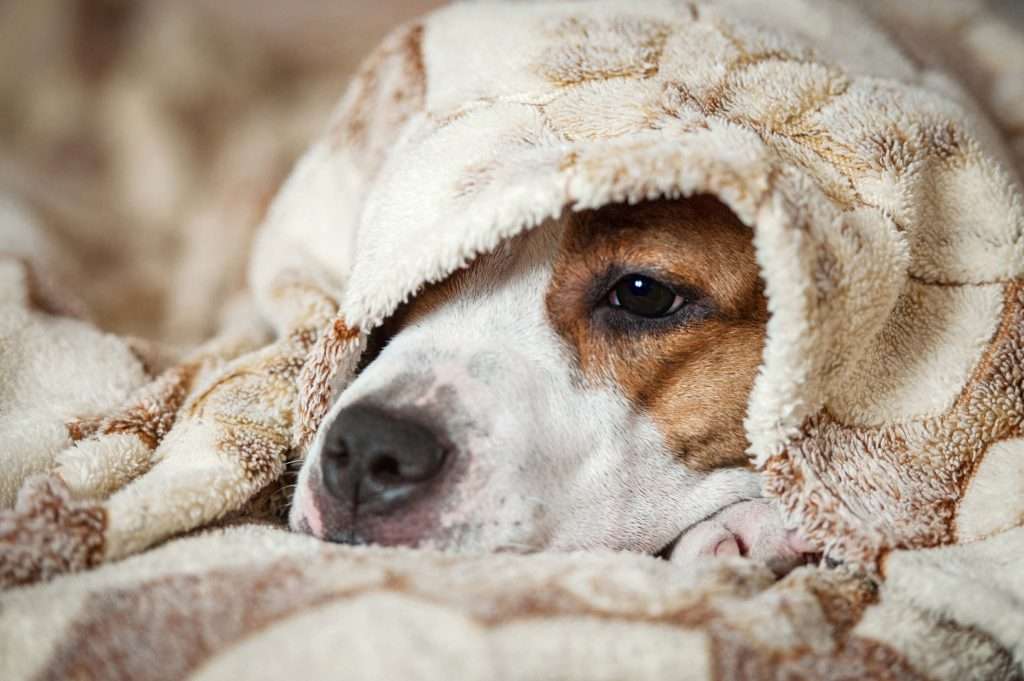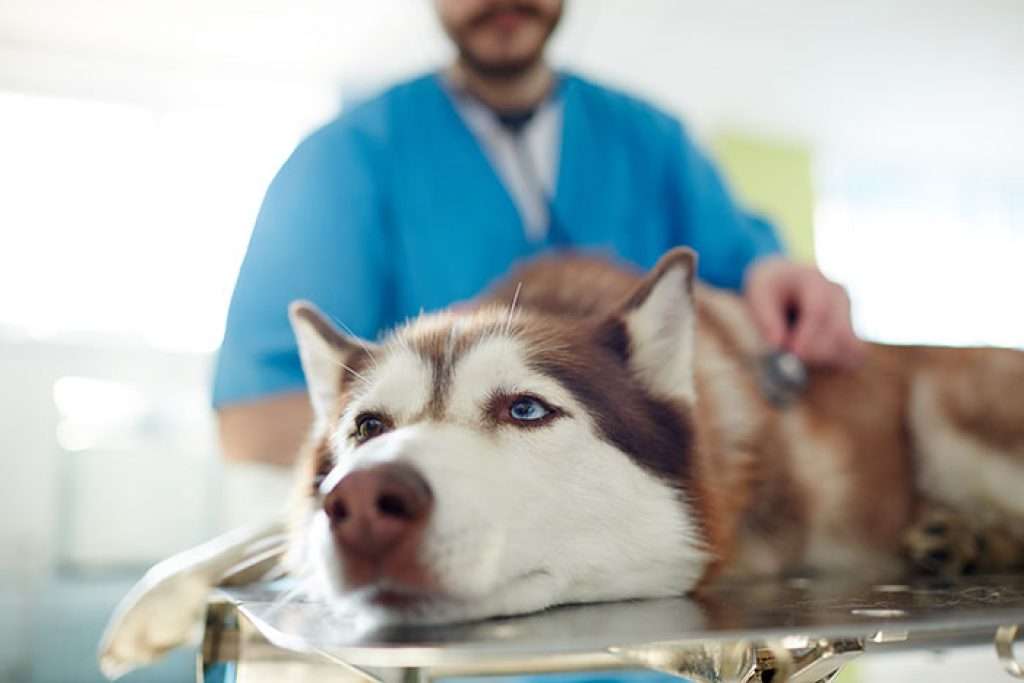Most owners will panic and worry if their dog comes down with diarrhoea, but it is not always due to an illness. Diarrhoea in dogs is relatively common. However, there as a dog owner it is important to understand the early symptoms, possible causes and treatments available to help your four-legged friend through the outburst.
There are several reasons why dogs can get diarrhoea, some of which are medical conditions that require treatment.
Some common causes of diarrhoea in dogs include:
- Infections such as parasites, bacteria, or viruses
- Food allergies or sensitivities
- Inflammatory bowel disease
- Cancer
- Kidney or liver disease
- Excessive drinking or urination
- Stress or anxiety
- Side effects of medication
- Pancreatitis
- Poor nutrition

When should you take your dog to the vet?
- If your dog is still a puppy
- There is severe diarrhoea
- The diarrhoea lasts for more than a day or two
- Your dog is also being sick
- Your dog is already struggling with a previous illness
When should you consult a vet immediately?
- Your dog seems apathetic
- Your dog is not drinking enough fluids
- Your dog’s stools contain blood or are coloured black (this is digested blood)
- Your dog is vomiting, and/or fever occur parallel to the diarrhoea
- The animal’s vital signs drop rapidly, and there are signs of fatigue
What happens in a dog’s body?
Your dog’s digestive tract begins in the mouth, where the first bacteria are involved in processing their food.
The tract leads to the anus, where the end product – the faeces – is excreted.
In between, the food ingested by the dog passes through numerous organs, all of which are responsible for the food intake.
If just one of these organs is diseased, it can trigger diarrhoea in your pet.
In addition to the mouth, this also includes the pharynx, teeth, tongue, oesophagus, stomach, liver, pancreas and the small intestine, large intestine, and rectum.
Early detection of diarrhoea in dogs
Diarrhoea has numerous traits, which can identify the type of disease or cause. In most cases, the consistency and colour of the faeces will indicate the reason for the diarrhoea.
Side effects may also provide clues as to the origin of the disease.

Classic symptoms of diarrhoea in dogs
- Liquified faeces
- Faeces containing blood / dark red stool streaked with blood
- Slimy, or green diarrhoea
- Very frequent defecation
- Severe flatulence
- Weight loss
- Lack of appetite
If one or more of these symptoms appear and persist, your dog should immediately be taken to the veterinarian.
It is important to look for the causes of diarrhoea.
This is the only way to ensure a successful treatment. A laboratory examination of the stool can quickly determine this, so a sample may be required if a vet visit is needed.
Poor nutrition and diet-related diarrhoea
Feeding your dog a species-appropriate and balanced diet is not always easy.
A poor diet will often cause diarrhoea.
This could be caused by the dog food, allergies, changing the food quickly or incorrect preparation.
Every dog is unique in its own way, so its diet should also be individually adapted to the animal and its needs.
Overeating – If your dog overeats food, the body tries to get rid of the excess quickly, and can result in diarrhoea.
Food should be at room temperature (not too hot or cold) to protect your dog’s stomach. The size of the portion is also important and should be individually tailored to the animal.
Changing your dog’s diet – Changing the type of food or feeding several brands/types of food simultaneously (e.g. wet food offered as a meal and dry food offered permanently) can lead to diarrhoea and vomiting in your dog.
Therefore, you should choose a high-quality dog food that your dog has no reaction to and loves.
Intolerances or toxic foods – Food intolerances or toxic/unhealthy foods can cause diarrhoea in dogs. While allergic reactions and intolerances can only be determined with an elimination diet, well-known foods should be avoided.
Foods not tolerated by dogs:
- Chocolate (poisonous!)
- Chicken bones
- Raisins (poisonous!)
- Grapes (poisonous!)
- Various types of nuts
- Onions
- Garlic
- Coffee, tea and many other drinks
- Cooked or uncooked meat, unless the animal is used to it
Other food triggers:
- Diary products
- Greasy food
- Spoiled food
- Waste or unclean drinking water
Other causes of diarrhoea in dogs
In addition to food-related triggers, several other diseases could be the cause. These can usually only be determined during a detailed examination by a veterinarian.
Parasite infestation – In many cases, worms and other intestinal parasites cause diarrheal diseases. They are often picked up during daily walks, especially if the dog smells other animals’ droppings or eats them!
Your dog’s faeces should be examined for worms (especially roundworms, hookworms and whipworms), and a worm treatment may be required.
Chronic inflammation in the gastrointestinal tract – Many triggers can lead to chronic inflammation of the dog’s gastrointestinal tract, including strongly seasoned foods.
Internal diseases – Tumors and cancer could cause diarrhoea along with a malfunction of the liver, kidneys, or other organs. A veterinarian can explore these possibilities.
Swallowed foreign objects – If a foreign object becomes lodged in your dog’s gastrointestinal tract, the body will attempt to remove it in several ways. Diarrhoea is one of these ways. Surgery is often necessary if this happens to remove the object.
Poisoning – Even in the case of severe poisoning, your dog’s body will try to eliminate the harmful substances out of its body, resulting in diarrhoea and vomiting.
It doesn’t matter whether your dog just came into contact with the poison (rat poison via bait) or whether it ate it (poisonous plants or food). Depending on the type and intensity of the poisoning, there is an acute danger to life, so you must immediately take your pet to the vet to save its life.
Stress – Dogs can react to stressful situations by having diarrhoea or vomiting. Fear, nervousness, panic or a change in general living conditions can upset the animal’s body.
Diarrhoea as a side effect in dogs
If your dog has an illness and is being treated with medication, a side effect could be diarrhoea.
You can often find any relevant information regarding this on the medication leaflet.
Possible consequences of diarrhoea in dogs
- Severe loss of fluids and dehydration of the dog could lead to a complete collapse.
- There is a severe lack of essential nutrients that are usually absorbed but are not due to diarrhoea.
- There is a massive loss of body weight and energy. This can be hazardous, especially in animals already very thin or weak (puppies and young dogs are particularly at risk).

Helping your dog recover from diarrhoea
There are a number of things you can do to help your dog recover from diarrhoea, including:
- Make sure that it has plenty of water to drink. You can quickly check your dog’s water balance. To do this, grab a fold of skin on the animal’s back and pull it up slightly. If the skin goes back immediately, the dog has enough fluid in its body. However, if the wrinkle stays, the dog is already dehydrated and needs medical help quickly.
- Let your dog rest and take it easy.
- Giving bland, easily digestible foods such as boiled chicken or white rice.
- Avoid fatty or spicy foods, as well as dairy products.
- Providing a humid environment helps soothe the digestive tract.
- Administering over-the-counter medications such as antidiarrheal drugs or probiotics is recommended by your vet.
If the diarrhoea is not particularly severe, your dog’s stools are typically solid, diarrhoea does not last longer than 24 hours, and no other illnesses such as vomiting or weakness of the animal occur, it is usually a harmless symptom.
In all other cases, we advise you to consult a veterinarian immediately.






